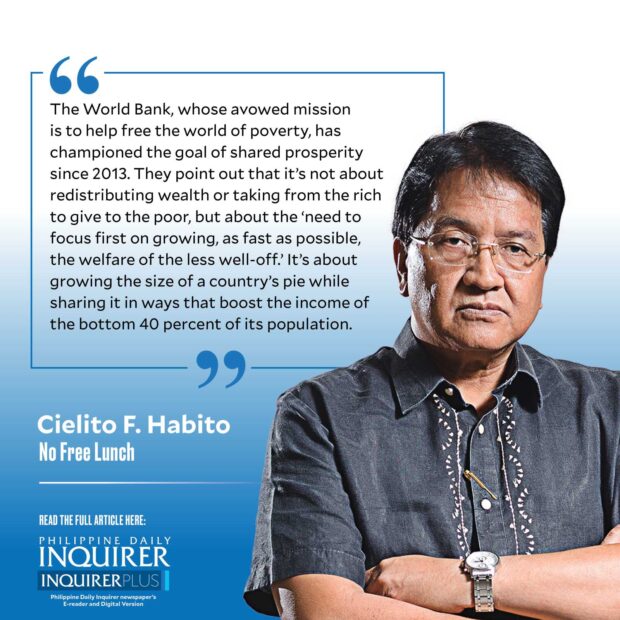The rewards of sharing

Mas maraming bumunga ang puno kapag mahilig magbigay ang may-ari (The tree bears more abundant fruit when the owner gives away more of it),” I recently heard someone tell his workmate, to which the latter heartily agreed. They were talking about a friend who had shared with them sweet mangoes from his own tree. That exchange warmed my heart, as their conversation seemed to suggest that it’s a widely held belief among us Filipinos that sharing is always rewarded with more blessings. It’s something I can personally relate to, having seen it happen in my own life over the years. Many times when I decided to be generous—whether to a person in need, to a church, or to a charity—I invariably found even more resources coming my way soon after, often unexpectedly. It felt uncanny sometimes, but it helped reinforce my willingness to be generous when called for. I have come to believe that sharing is indeed a grace that reaps its own rewards.
My inspiration was my father, who was an extraordinarily generous man. Having worked overseas for an international institution in his active professional life, he retired with an ample monthly pension that more than supported his needs. He chose to spend much of it financing needy students with their studies all the way through college. I knew him to be constantly supporting at least one student at any given time even while still working overseas, including students in his postings in Latin America and Africa. Among his beneficiaries were less-endowed relatives of ours, but more had been total strangers that he had somehow managed to identify and found deserving. In his retirement, he occasionally caused us worry when he would resort to borrowing money from one of us his children to tide his cash flow over until his next pension check arrived. That’s when we came to realize that he was probably sharing more than he could actually afford to. We could not fault him for it, of course, but in his twilight years, it seemed that his generosity had gone even to the point of self-deprivation. Still, he had already reaped during his active years the rewards of his generous sharing, and we in his family enjoyed its fruits.
The World Bank (WB), whose avowed mission is to help free the world of poverty, has championed the goal of shared prosperity since 2013. They point out that it’s not about redistributing wealth or taking from the rich to give to the poor, but about the “need to focus first on growing, as fast as possible, the welfare of the less well-off.” It’s about growing the size of a country’s pie while sharing it in ways that boost the income of the bottom 40 percent of its population. The goal thus combines rising prosperity with (improved) equity. The WB operationalizes its measurement and monitoring by tracking the incomes of the bottom 40 percent across countries, alongside tracking overall GDP and GDP per capita (i.e., average income per person).
It used to be assumed that growth in GDP trickles down to those bottom 40 percent. But the United Nations, WB, and various institutions have documented that (1) even as income disparities across countries have narrowed, inequality within countries has risen in most of the world; (2) labor income’s share in GDP worldwide has declined over time in the face of a rising share of profit income; and (3) the gap between CEO pay and typical worker salaries keeps widening. The Economic Policy Institute found that in 2021, US CEOs were paid 399 times as much as a typical worker, up from 366-to-1 in 2020 and a huge increase from 59-to-1 in 1989, and 20-to-1 in 1965. An article in Forbes cites data from JUST Capital showing that average CEO pay increased 31 percent over the pandemic years, while median pay rose only 11 percent.
The Management Association of the Philippines has been at the forefront of the advocacy for shared prosperity and holds annual summits on the topic. One of seven pillars in its Covenant for Shared Prosperity signed by summit participants is to “create a fair workplace,” which translates, among other things, into “providing just compensation and benefits” to employees. Its proponents now talk about aspiring to ensure living wages for workers. But there are those who are privately cynical, arguing that they are running a business, not a charity. Still, no one is asking businesses to forego reasonable profits, but only to settle for less, to at least stem the adverse trends in labor and profit income shares and widening CEO-worker salary gaps described earlier. In the end, promoting shared prosperity in business could be self-serving, as it helps forestall growing inequality that leads to rising social tensions, and in turn, higher incidence of crime, violence, and at the extreme, anarchy. It promotes social harmony and wider and sustained security—ultimately everyone’s lasting reward for sharing.
cielito.habito@gmail.com




















